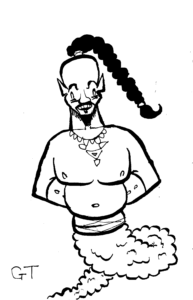
For the past few years, many have felt that Hollywood is in a bit of a creative slump. The Marvel Cinematic Universe (MCU) has stopped taking risks, even original Disney films like Raya and the Last Dragon have started receiving backlash for their lack of intrigue, and so on. The remake, while not a genre, has certainly started to feel like its own category of storytelling. Every year, a new remake or reboot comes out, usually with one small element introduced to make it seem new, all while remaining the same thing it once was. Usually, the reception is subpar, and the box office remains unimpressed with these last-ditch money-making schemes. So why spend valuable dollars on these films?
There are a few different sorts of remakes that have been adapted to the big screen in the past decade, namely horror movie remakes, Disney live-action reboots, and occasional remakes of 80s and 90s films. In terms of Disney’s live-action remakes, a few criticisms have been launched at the media empire, namely from film news services such as Variety, Looper, Screenrant, and others. Among these criticisms, the main ones tend to be that they feel like a cheap cash-grab, given that the nostalgia of their audiences will fill theatre seats regardless of the actual interest in the film or the quality of what is being shown on screen. It may be safe to assume that the driving force behind these remakes, as is the driving force behind any corporate entity, is capital. Disney, and other studios, are free to reboot their films because they are certain audiences will watch.
It does, however, seem strange that to make money, they would decide upon a remake, when constructing a perfectly original plot could make them much more money in the long run. Likewise, it could help ensure that they do not face more backlash for failing an adaptation that meant a great deal to audiences. Film critics like Owen Gleiberman have made note of the fact that we seem to be enduring a dry spell from Hollywood, one where their creativity has run aground. However, given the expanse of creatives that exist outside of Hollywood’s studio executives, it seems difficult to believe that creativity in film has hit such an incredible dry spell. After all, we have seen major success for more independent films such as Everything Everywhere All At Once, which not only told an original story, but did so in a way that captivated audiences across the globe, from all walks of life. In fact, one need only follow independent film writers to see just how many original scripts are being made. The problem is that these film authors are repeatedly rejected.
There are many great ideas out there in the big wide world of movies, but studio executives are playing it safe, which can feel very strange to audiences given film’s reputation as a medium that pushes boundaries and takes chances. Of course, there are many films from the past few decades that will go down in the history books as being truly amazing. On the other hand, there will also be many movies that are likely forgotten over time, and remakes will likely be no stranger to this phenomenon. The rewatch-ability of original films is incredibly important, and the reason they are even considered for remakes at this time is because of their original popularity. The difficulty now is that a remake will likely not stand the test of time in the same capacity. Original animated films such as Beauty and the Beast or The Lion King were highly praised in their own individual mediums. Audiences have been less impressed with their new CGI counterparts. Though their new CGI models look phenomenal, the general lack of interest in these character models may point to a larger issue in remake cinema: lack of soul. According to Looper, though there were clearly major expenses paid in order to achieve such appearances, the original animated films had a deeper sense of character, while the new remake characters seem soulless, less colourful, and far less whimsical.
The fact that a company like Disney is undergoing such a seemingly stagnant mode of creativity when they were at once credited with a 90s film Renaissance, is bizarre to say the least. Companies are playing it safe, and it is paying off. There is nothing to force them out of their shell quite yet. In fact, many reboots are finding huge success. Though the general audience reaction towards a remake is still overwhelmingly negative, the few successes, mixed with the fact that even the negatively reviewed films are able to rake in millions of dollars, have only proven to big-name studios that taking risks is not necessary. The problem here is greed, and unless audience-related statistics change and this change necessitates a need for more risk-taking, more intrigue, and more creativity, the trend of remakes will remain in place. Companies and corporations do not value their customers, and this trend is more proof of that. Audiences are generally unhappy, and despite this, the trend has continued, because it has not caused serious losses, and has maintained steady financial income for the various companies involved in the process.
Disney and other studios are happy to continue milking their products. The trend of remakes, no matter how disappointing, will remain so long as money can be made from it. However, despite this, cinema is healing. The past year has given us many great films such as Barbie, Oppenheimer, Everything Everywhere All At Once, Spiderman Into the Spiderverse, Past Lives, Asteroid City, and so on. With corporations in charge, movies will be majorly affected, but there are still great films on the horizon.





